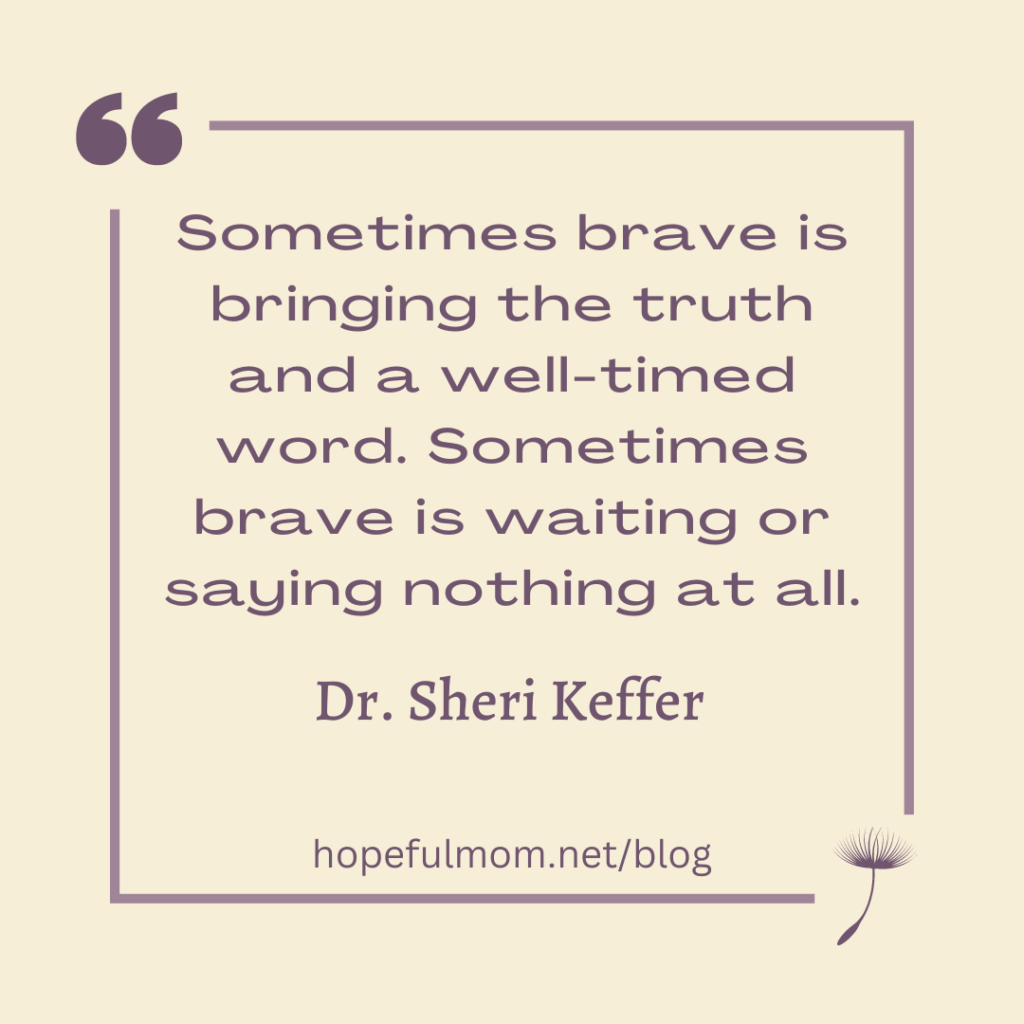I am over-the-top thrilled to have Dr. Sheri Keffer here with us. Her book, Intimate Deception: Healing the Wounds of Sexual Betrayal, changed my life. While the book is primarily for wives who’ve experienced betrayal, the information also pertains to parents who’ve experienced betrayal. The following post, first published on Dr. Sheri Keffer’s website, is applicable to both spouses and parents. I’m sure you’ll find the article informative and transformative. ~Barb
Several months ago I was driving on the freeway. From the corner of my eye I noticed a car coming directly toward me. It was surreal. In a fraction of a second I was broadsided – no fault of my own. I just happened to be in the wrong lane at the wrong time.
It was unavoidable. The car crossed ALL four lanes in a horrible attempt to exit the freeway. My car was white. They didn’t see me. On impact, I saw black.
Like a four-lane freeway, our bodies are designed to instantly pick a gut reaction when our life and safety are at stake. In an attempt to keep stay safe we go into fight, flight, freeze or fold.
When we find out we’ve been sexually betrayed these four lanes become natural reactions to protect us from our pain. These are normal reactions. Thank goodness as human beings our blueprint is wired that way.
Fight, flight, freeze, or fold are normal reactions when we find out we've been sexually betrayed. They are designed to protect us from our pain. For more, read The Four Lane Freeway by guest Dr. Sheri Keffer #hopefulmom… Share on XOur bodies are designed to keep us alive, at all costs.
Yet sometimes, like a thermostat jammed on high, these normal reactions become rigid and keep us stuck in painful patterns of reactivity.
Bravery can help us push through to get to a better place.
Fight – We push against.
- We might tell all and wish we had waited to respond.
- We discover we can’t take our words back.
- Our children are hurt with information they can’t do anything about.
- Unsafe people take our painful story to the street.
- We may act out our anger and feel regret after we caused someone else or ourselves harm.
Honestly, we just needed time to think….to catch our breath. We tearfully say this isn’t who I am. I wasn’t this angry before.
I know. I believe you. It’s a reaction to what’s happened to you.
Sometimes brave is bringing the truth and a well-timed word. Sometimes brave is waiting or saying nothing at all.

Flight – We shrink back or run away.
- We throw ourselves into early Spring cleaning, folding laundry or our kids soccer games – anything to take the edge off the pain.
- We busy ourselves helping others while we’re bleeding out in the inside.
- We avoid tough conversations that need to take place or decisions that need to be made.
- We walk away from getting help and support that we desperately need.
Sometimes brave is doing the opposite from what feels natural. It’s leaning in rather than pulling back. It’s sitting with others who understand. It’s being held well by those that will listen to our pain. We don’t have to scream. It’s being with others when we’re feeling hopeless and can’t find the words to say.
Sometimes brave means stopping to get quiet, so you can hear yourself think.
Freeze – Like a deer frozen by oncoming headlights we do nothing.
- We avoid looking at what’s real.
- We cover up what we know to be true.
- Like the three little monkeys we put our hands over our eyes, ears and mouth. Fear courses through our veins. The house is burning down; yet for some strange reason we look in the other direction.
I know. I did it too.
I played possum with myself, hoping the whole ugly mess would just somehow go away.
I prayed yet didn’t take steps of action. It felt like my feet were trudging through mud. I hoped that God would somehow rescue me.
Fold – We collapse.
- We do nothing.
- We become small.
- We comply.
- We get used.
- It feels as if we melt into a pile of goo.
Sometimes we can be in more than one lane, or even cross all four lanes! But it’s possible to get off the exit, safely. Here’s how.
4 Brave Acts to Consider:
- Be kind to yourself. Compassion is BIG. We often get frustrated when we feel stuck in a way of being. It can even make us more scared. Kindly tell yourself the truth. Okay, I am frozen today. What can I do to make myself feel safer in the inside? Take a walk. A hot shower. Let the tears flow. Make a cup a tea and feel the warm mug on your hands. Put some fresh cut flowers in a vase. Call a friend and tell her how frozen you feel. Doing so begins to melt away the deep freeze and connect you with others and to what’s happening here today.
- Write down what is happening. Making a list with four columns on it can help you to see which lanes you are in. It helps us make sense of what may be happening in our brains and body.
- Deep breathing, moving your body and meditating on truth can help remind you of possibilities. Some people do yoga, others garden, some run or read. What is it that helps to ground your feet on the floor again? Your mind and your body need to work together.
- Reach out for help. Get advice from professionals that understand reactions to stress and trauma. Sometimes our bodies need help from seasoned physicians, counselors and psychiatrists. It’s about how your brain and body are reacting. It’s not who you are. Be open to intervention to help your body rest.
Our brains, bodies and minds can change. Try taking one of these 4 steps to make yourself brave.
Bravely yours,
Dr. Sheri
If this post or anything at the Hopeful Mom website has impacted you, please share it. Also, read Dr. Sheri Keffer’s bio and visit her website. Her Brave One community is opening October 5th. Subscribe to Hopeful Mom below and register for SHE Virtual Recovery Summit here. And, as always, feel free to contact me directly.
About the author

Dr. Sheri Keffer
Dr. Sheri Keffer is a regular cohost of the nationally syndicated radio talk show New Life Live! with an audience of more than two million people each week. For over twenty years, she’s worked as a Doctor of Marriage and Family therapy in Newport Beach, California. Through her own personal story of recovery Dr. Sheri understands the trauma symptoms often associated with sexual betrayal. As a Certified Partner Trauma Therapist Supervisor (CPTT-S), Certified Clinical Partner Specialist (CCPS), Certified Sex Addiction Therapist (CSAT) and a Consultant in EMDR, she brings new tools and a fresh look at what’s needed not only to heal but heal well. Dr. Sheri’s a keynote speaker and recipient of 2019 IITAP Outstanding Publication Award for her book Intimate Deception: Healing the Wounds of Sexual Betrayal, Founder of BraveOne.com, the BraveOne Community braveone.com/community, and Bravery After Betrayal: It Takes Fierce Strength retreat where she unpacks how betrayal affects the mind, body, spirit, and sexuality. Dr. Sheri also holds a degree in theology from Fuller Theological Seminary. You can follow her on social media @drsherikeffer.



One Reply to “The Four Lane Freeway”